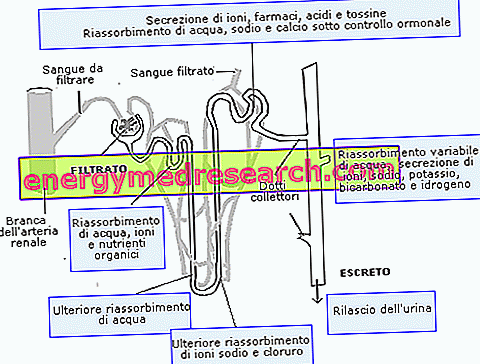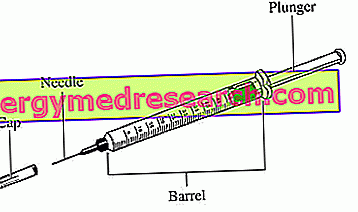By Dr. Massimo Golia Type 2 diabetes mellitus includes a heterogeneous group of metabolic diseases, characterized by chronic hyperglycemia and disorders of carbohydrate, lipid and protein metabolism, deriving from the lack of production and / or the resistance of peripheral tissues to the action of insulin
Category diabetes
Premise The complications of diabetes (or diabetes mellitus ) are the unpleasant consequences that can arise from this serious metabolic disease. Diabetes is caused by a deficiency of insulin - a key hormone for maintaining normal blood glucose levels - and its characteristic clinical sign is the high concentration of glucose in the blood ( hyperglycemia )
See also: cholesterol conversion - triglycerides mg / dL - mmol / L Online calculator The blood glucose values (glycaemia) are expressed in milligrams per deciliter (mg / dL) or in millimoles per liter (mmol / L); this last unit of measurement is the one adopted by the SI and as such represents the reference standard at international level. To
Premise The understanding of this article requires the knowledge of some preliminary notions illustrated in the previous article dedicated to hypo-glycemic crises. What is a hyperglycemic crisis? A hyperglycemic crisis is the phase between the moment in which the blood sugar rises significantly above the values considered normal (hyperglycemia) and that in which the blood sugar drops, returning to the normal range, due to an adequate therapeutic intervention. It
Premise hypoglycemia, hyperglycemia and blood glucose regulation Hypoglycemia is the medical condition whereby the rate of glucose in the blood, under fasting conditions, is lower than the values considered normal; hyperglycemia is the opposite condition, namely the presence of a fasting level of glucose in the blood, higher than the values considered normal. > I
Generality D-dimer is a degradation product of fibrin, a protein responsible for the formation of clots (thrombi) in blood vessels. In the clinical setting, the determination of D-dimer in the blood is part of the diagnostic procedure of deep vein thrombosis and pulmonary embolism . This examination is therefore particularly useful in the study of diseases related to excessive or inappropriate coagulation
Generality Diabetes, whose most appropriate name would be diabetes mellitus , is the best known metabolic disease that can affect humans. Its onset is related to insulin ; to be precise, it may depend on a reduced availability of insulin (whose production does not meet the body's needs), on the low sensitivity to the hormone by the target tissues or, finally, on a combination of these factors
Generality Diabetes insipidus is a rare syndrome characterized by conspicuous urine emission, accompanied by an insatiable thirst with preference for cold drinks. It is due to a lack or insufficient secretion of the antidiuretic hormone (ADH or vasopressin) from the hypothalamus and the posterior pituitary, or from its lack of renal activity
Risk factors That between diabetes and erectile dysfunction is a binomial known for a long time, confirmed by numerous epidemiological studies. It is the statistical data that tells us that: in the diabetic patient the erectile deficit is three times more frequent than in the healthy control population
Generality Gestational diabetes (GDM) is a metabolic disorder characterized by reduced glucose tolerance (and less frequently by franc diabetes), which occurs or is diagnosed for the first time during pregnancy . The definition of gestational diabetes, therefore, does not exclude the possibility - moreover frequent - that a pre-existing carbohydrate intolerance is unmasked and aggravated by gravidic "stress"
Diabetes and Insulin Therapy The one between insulin-dependent diabetes and insulin-independent diabetes is a distinction made in the attempt to classify the various forms of diabetes mellitus, based on the need or not to resort to replacement therapy with insulin. First of all it should be clarified that any form of diabetes mellitus may require continuous or occasional insulin therapy , whatever its stage; therefore, the use of insulin by itself cannot classify the patient







